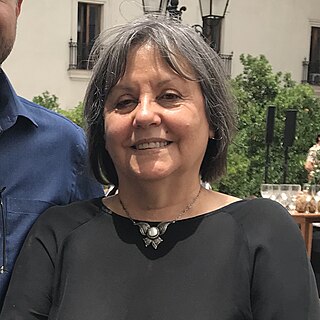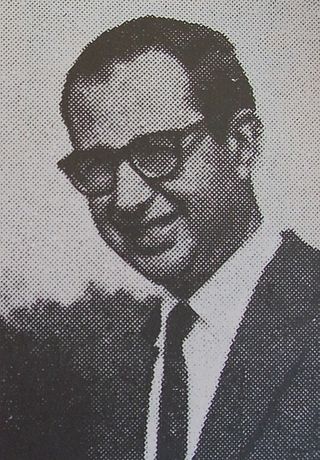Related Research Articles

Francisco Ayala García-Duarte was a Spanish writer, the last representative of the Generation of '27.
Hernán Neira is a Chilean writer, philosopher and university professor.

The Beagle conflict was a border dispute between Chile and Argentina over the possession of Picton, Lennox and Nueva islands and the scope of the maritime jurisdiction associated with those islands that brought the countries to the brink of war in 1978.

Diamela Eltit is a Chilean writer and university professor. She is a recipient of the National Prize for Literature.

Noé Jitrik was an Argentine literary critic.
José Luis Osvaldo Lira Pérez SS.CC. was a Chilean priest, philosopher and theologian who wrote more than 10 books on topics related to the philosophy of St. Thomas Aquinas, as well as Ortega y Gasset and Juan Vázquez de Mella. He devoted most of his life to teaching in different universities, and had as many followers as opponents.

On 22 July 1971 Salvador Allende and Alejandro Lanusse, the Presidents of Chile and Argentina, signed an arbitration agreement. This agreement related to their dispute over the territorial and maritime boundaries between them, and in particular the title to the Picton, Nueva and Lennox islands near the extreme end of the American continent, which was submitted to binding arbitration under the auspices of the United Kingdom government.

Fernando Cabrera is a Dominican-American poet, essayist, visual artist, songwriter and professor. He is a National Poetry and Literary Essay Prize Winner.

Braulio Arenas was a Chilean poet and writer, founder of the surrealist Mandrágora group.
Mario Góngora del Campo was a Chilean historian considered "one of the most important Chilean historians of the 20th century". Though his work he examined the history of the inquilinos, the encomentaderos, rural vagabonds and Indian Law. He was in charge of university courses on medieval history.

Juan Eslava Galán, is a Spanish writer of historic genre, both fiction and non-fiction. He has published some of his works under the pen name Nicholas Wilcox.

Samy Mauricio Benmayor Benmayor is a Chilean painter who formed part of the Generation of '80 movement.
Omar Acha is an Argentine historian and political essayist. He is a researcher at the Consejo Nacional de Investigaciones Científicas y Técnicas and also at the Centro de Investigaciones Filosóficas (Argentina). He teaches Philosophy of History at the Universidad de Buenos Aires. He was also a member of the editorial board of Herramienta. Revista de Teoría y Crítica Marxista, published in Buenos Aires.

Manuel Antonio Garretón is a Chilean sociologist, political scientist and essayist. He received the National Prize for Humanities and Social Sciences in 2007 for his lifetime contribution to the field.

Centro de Estudios Públicos (CEP) is a non-profit Chilean think tank founded in 1980. Its stated mission is to “contribute to the development of a free and democratic society” through: 1) the analysis and dissemination of philosophical, political, social and economic problems of interest to Chilean society; 2) the study, discussion and design of public policies; and 3) the promotion of institutions that support and enable the existence of a constitutional and democratic order. CEP contributes to the public debate through its seminars, the policy brief Puntos de Referencia, the journal, Estudios Públicos which has appeared continuously since 1980, the publication of books and various research studies, as well as social surveys, which have been conducted since 1987. CEP has become a household name for political, academic, and intellectual debate.

Marco Antonio de la Parra is a Chilean psychiatrist, writer, and dramatist. Many of his works, which are strongly influenced by the country's 1973–90 military regime, satirize the national condition through metaphors. He is the author of more than 70 titles translated into several languages, including plays, novels, storybooks, and essays.

Santiago Muñoz Machado is a Spanish jurist and academic, director of the Royal Spanish Academy and the Association of Academies of the Spanish Language since 10 January 2019. As a jurist, he specialized in administrative and constitutional rights. He is also a member of the Royal Academy of Moral and Political Sciences and editor of the Diccionario del español jurídico and the Diccionario panhispánico del español jurídico.
Sonia Cristina Montecino Aguirre is a Chilean writer and anthropologist. In 2013, she was awarded the Premio Nacional de Humanidades y Ciencias Sociales

José Félix Tezanos Tortajada is a Spanish sociologist, politician, and professor. He serves as political president of the Centro de Investigaciones Sociológicas (CIS) since 2018.

Humberto Waldemar Asdrúbal Baeza Fernández, also known as Tito Fernández, El Temucano, was a Chilean singer-songwriter and folklorist. He recorded and released more than 40 albums from the 1970s to the present.
References
- Efraín Szmulewicz : Diccionario de la Literatura Chilena. Ediciones Rumbos, Santiago, 1997. ISBN 956-7295-34-4, pp 414–415.
- ↑ "Falleció escritora y periodista Virginia Cox" [Writer and Journalist Virginia Cox Dies]. El Mercurio (in Spanish). 3 October 2002. Retrieved 18 April 2017.